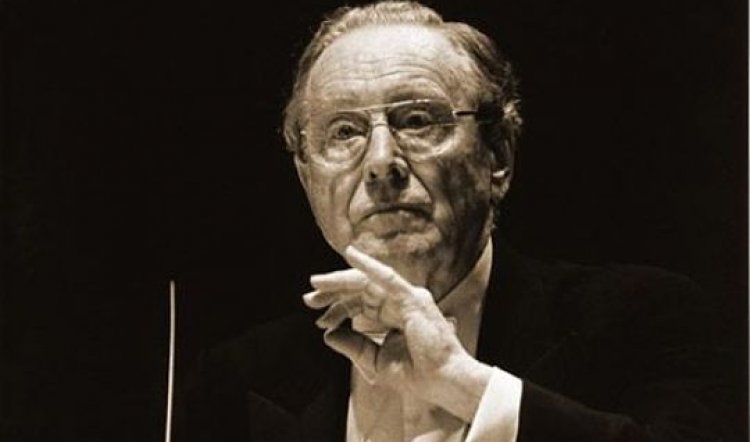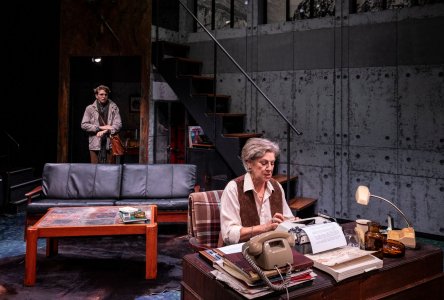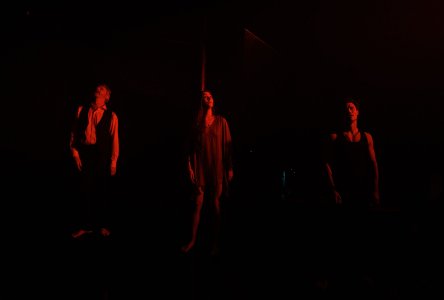
Sir Charles MacKerras 1925-2010
Alan Charles MacLaurin Mackerras was born on November 17, 1925 in, of all places, Schenectady, New York. His electrical engineer father was doing postgraduate work in the US and the family – mother Catherine MacLaurin – did not come home to Sydney until Charles was three. Turramurra later became home for him and, in quick succession, his brothers Alistair and Neil, sisters Joan and Elizabeth and finally, twins Malcolm and Colin.
The Mackerras children were all encouraged to make something of themselves and the name is familiar in Australian public life not just because Charles is an international colossus in music.
Charles started on the violin when he was six and then switched to piano and flute; in his spare time be began setting poems to music. At 12 he wrote a piano concerto at Sydney Grammar – a convenient walk from the Conservatorium where he spent an awful lot of time. Quoted in the SMH, in 2005 he said, ”I always wanted to become a musician. It got to be that I was hardly interested in anything else. From about eight or nine I had a sort of mania about it.”
The mania persisted all his life and became a burning determination to perform great music. In March this year he was scheduled to conduct Janacek’s The Cunning Little Vixen at Covent Garden and, although frail from living for some years with cancer, and having cracked a couple of ribs in a fall, he was in the rehearsal room from the outset.
Emma Matthews, engaged by Mackerras to sing the Vixen in her Covent Garden debut, has fresh memories of her experience with the maestro on that day. “It was lucky that I’d already sung the role for Alex [Briger, the maestro’s nephew and conductor of the fine 2004 Opera Australia production] and when Sir Charles auditioned me in 2008 I sang a score he knew and approved of; and he just said ‘yes! Yes! Yes!’” But on the first morning of rehearsals in London he expansively introduced Matthews to the company as, “my Australian soprano”. Says Matthews now, “I thought – uh oh, what are they going to make of me?”
Any suspicion that the newcomer was just the maestro’s pet was soon dispelled, however. “When I began singing, he stopped me within the first three or four bars and said, ‘no! No! No! That’s not right’ and I thought I had the wrong score. You can imagine what it was like. But it all worked out.”
Mackerras’s reputation for being a stickler for the music and demanding of his musicians and singers goes back to his earliest days in London, but the determination to do the very best came much earlier. His parents didn’t see music as a viable career though, but even being exiled to The King’s School with sport and discipline in place of his musical life couldn’t quell the passion. He got himself expelled and finally was allowed to return to the Con at 16. He continued to be precocious and was soon earning a living as a musician: writing orchestral scores (by ear from recordings) and performing as the ABC Symphony’s second oboe; an instrument he mastered on realising there was a shortage of players in wartime Sydney.
But the resolute teenager wasn’t satisfied with sitting in the pit, or settling for what would essentially be a provincial career, and in 1947 he left for London and two life-changing encounters. He had already decided to become a conductor and while reading a Dvorak score in a London café a stranger suggested he apply for a scholarship to study in Czechoslovakia. He did but not before marrying Judy Wilkins; the two went to Prague and a lifelong marriage and, for the conductor, a profoundly important role as an interpreter of Janacek.
”He was a perfectionist,” says Emma Matthews of the man who conducted the English premiere of Katya Kabanova in 1951, “But he was a wonderful person to be around. I think we all knew we were very lucky. When I did Mozart’s C minor Mass in Sydney with Yvonne [Kenny] he would come in half an hour before to give us notes, things like ‘you were a quarter tone flat here’, or ‘sharp there’ and then he’d take us through it. That kind of attention to detail isn’t something you really expect from older conductors; they can get a bit blasé, but not Sir Charles.”

As well as the brilliant career in London, Mackerras was the Sydney Symphony’s first Australian-born chief conductor (1982-85) and they performed the first concert in the new Sydney Opera House’s concert hall in 1973. Although based in England for most of his working life, he remained a favourite with Australian audiences, singers and orchestras not least because of substantial recording work: the complete symphonies of Beethoven, Brahms, Mahler and Mozart, as well as Mozart’s operas and the career-defining Janacek.
Emma Matthews saw a very different side to his life when she first arrived at the Royal Opera House. “He was treated like the king at Covent Garden. Everyone was very respectful because he really was royalty to them,” she recalls, and he was in the opera world: knighted by the Queen in 1979, awarded the Czech Republic’s Medal of Merit in 1996, and finally recognised by Australia with a Companion of the Order of Australia in 1980. “But he was enchanting,” says Matthews. “In rehearsal he sat behind the assistant conductor and directed and gave notes but didn’t actually conduct; but the broken ribs didn’t stop him laughing and he would come in every day with little things for us – pictures of vixens and foxes, stories – and he was always doing wicked things to make us laugh.”
Breaking the ice while keeping the rehearsal room charged and pushing his musicians and singers to reach beyond themselves was a Mackerras trademark, although he was famously impatient with slackers or the uncomprehending. For Emma Matthews, however, the experience of being a major part of his last production is a treasured memory.
“The musos would stomp and stamp when he came into the room,” she says. “There aren’t many conductors I can think of who are so revered. He was very kind to me; he told me funny stories when we were waiting and I’d sit on the floor beside his chair. Once he came with me to find the loos and we got lost; we were ten minutes late back to rehearsal…”
Mackerras was as dedicated and thorough in bringing the best to his last Vixen as he had ever been, says Matthews. “We’d meet up two and a half hours before the performance and go to his room and do the tricky bits. He’d conduct and sing the orchestral parts and the other roles – which was comical – and we would go over anything that might be a problem or wasn’t quite working.” For an Australian singer making her debut at the Garden, it was priceless.
Cunning Little Vixen was warmly reviewed in the UK press and it’s obvious nobody had an inkling that the conductor was in any way ailing. “He lived for that time on the podium,” says Emma Matthews. “He became like a boy again. He had such energy and conviction.”
Matthews’ last encounter with Sir Charles Mackerras was at the end of the Vixen run when he asked her to come to his room because he had something for her. “I had no idea what to expect, but it was a poster he’d found, from National Geographic, a beautiful photo of a vixen. He’d written on it ‘Good luck – Charlie’.”



